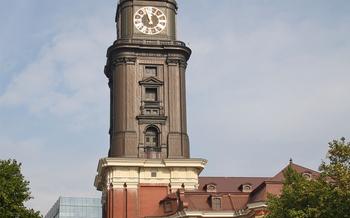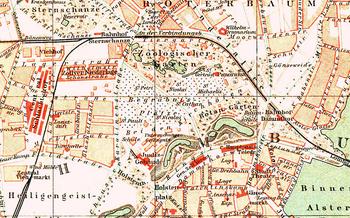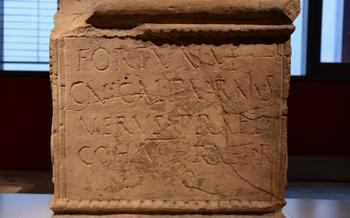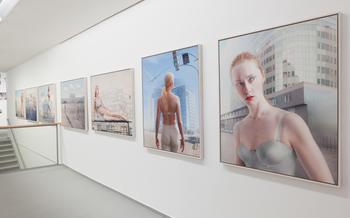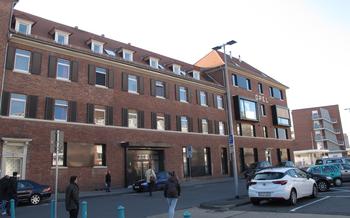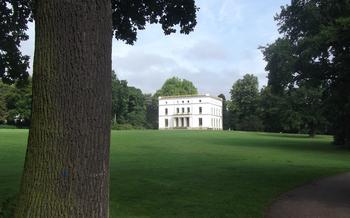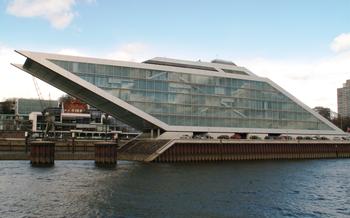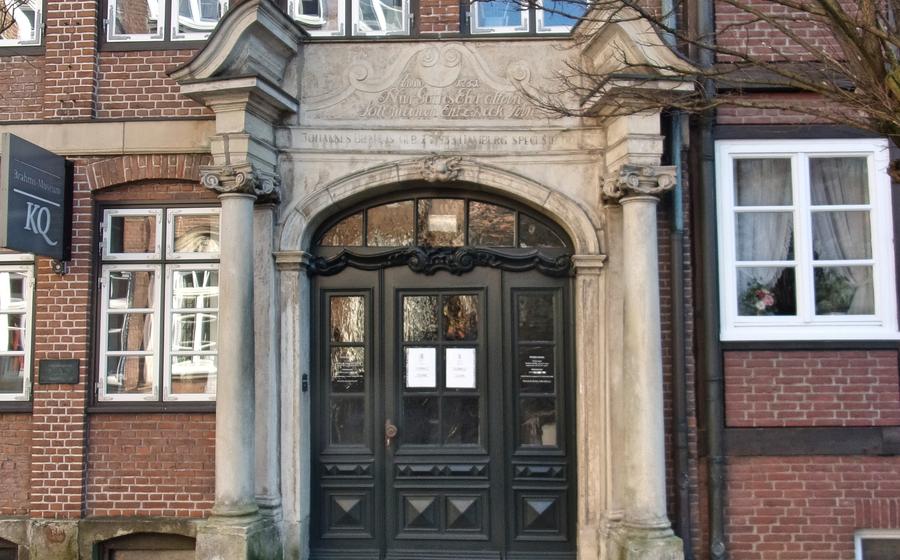
Brahms Museum
- Historical Significance
- Location and Accessibility
- Opening Hours and Admission Fees
- Permanent Exhibition
- Temporary Exhibitions
- Guided Tours
- Audio Guides
- Museum Shop
- Educational Programs
- Research Facilities
- Accessibility for Disabled Visitors
- Photography and Videography:
- Food and Drinks
- Visitor Information
- Insider Tip:
Historical Significance
Johannes Brahms, one of Germany's most celebrated composers, left an indelible mark on the world of classical music. The Brahms Museum in Hamburg offers visitors a unique opportunity to delve into the life and works of this musical genius. Established in 1971, the museum is dedicated to preserving and showcasing Brahms' legacy, providing a comprehensive insight into his creative process and the lasting impact of his compositions. Through interactive exhibits, multimedia displays, and a trove of personal artifacts, the museum invites visitors to explore the fascinating story of Brahms' life and immerse themselves in the beauty of his music.
Location and Accessibility
The Brahms Museum is conveniently located in the heart of Hamburg, a city renowned for its vibrant cultural scene. Situated at Brahms-Kontor 16-20, the museum is easily accessible by various modes of transportation.
Visitors can take advantage of Hamburg's extensive public transportation network, with several bus and metro lines stopping nearby. The nearest metro station is Gänsemarkt, a short walk from the museum.
For those arriving by car, the museum offers convenient parking options in the nearby CONTOR-Haus garage. The garage is located just a few steps away from the museum, ensuring a hassle-free visit.
The Brahms Museum's central location makes it an ideal starting point for exploring other attractions in Hamburg. Within walking distance, visitors can discover the historic Speicherstadt warehouse district, the vibrant HafenCity district, and the picturesque Alster lakes.
The museum is fully accessible for visitors with disabilities, featuring wheelchair ramps, elevators, and accessible restrooms. Additionally, the museum provides assistive devices such as audio guides and visual aids to enhance the experience for all visitors.
Opening Hours and Admission Fees
The Brahms Museum is open to the public from Tuesday to Sunday. The opening hours are from 10 am to 5 pm, with the last admission at 4:30 pm. The museum is closed on Mondays and on some public holidays. It is advisable to check the museum's website or call ahead to confirm the opening hours, especially during holidays or special events.
Admission fees for the Brahms Museum are as follows:
- Adults: 6 euros
- Students and seniors: 4 euros
- Children under 16: free admission
The museum offers a family ticket for two adults and two children for 15 euros. There are also discounts for groups of 10 or more visitors. The museum provides free admission to visitors with disabilities and their companions.
The best time to visit the Brahms Museum is during the weekdays, especially in the morning, to avoid crowds. The museum is less crowded during the off-season, which is from November to March.
Permanent Exhibition
The permanent exhibition at the Brahms Museum takes visitors on a journey through the life and work of Johannes Brahms. Through interactive displays, multimedia presentations, and a wealth of artifacts, the museum provides a comprehensive overview of Brahms' career as a composer, conductor, and pianist. Visitors can explore his early years in Hamburg, his rise to fame as a virtuoso pianist, and his later years as a respected composer and conductor. The exhibition showcases Brahms' personal belongings, including his pianos, manuscripts, and letters, offering a glimpse into his creative process and his relationships with other musicians. The museum also highlights Brahms's contributions to the development of German music, showcasing his influence on composers such as Gustav Mahler and Richard Strauss. Whether you're a classical music enthusiast or simply curious about the life of one of Germany's most renowned composers, the permanent exhibition at the Brahms Museum is a must-see for anyone visiting Hamburg.
Temporary Exhibitions
The Brahms Museum also hosts temporary exhibitions that complement the permanent collection and offer fresh perspectives on Brahms' music and legacy. These exhibitions often feature collaborations with other museums, institutions, or artists, allowing visitors to explore new interpretations and connections related to Brahms' work.
Past temporary exhibitions have showcased themes such as "Brahms and the Piano," "Brahms and His Contemporaries," and "Brahms and the Romantic Movement." These exhibitions have featured rare artifacts, manuscripts, and artwork, providing visitors with a deeper understanding of Brahms' creative process and his influence on the musical landscape of his time.
Temporary exhibitions at the Brahms Museum are typically included in the admission fee and offer a unique opportunity to engage with Brahms' music and legacy in new and exciting ways. They are a great way to learn more about Brahms' life and work, discover new perspectives on his music, and gain insights into the broader context of his time.
Guided Tours
Enrich your visit to the Brahms Museum by joining a guided tour led by knowledgeable experts. These tours provide an immersive experience, offering insights into Brahms' life, music, and the significance of his contributions. Guides bring the exhibits to life with captivating stories and anecdotes, answering any questions you may have along the way. Guided tours are available in multiple languages, ensuring accessibility for visitors from diverse backgrounds.
The cost of guided tours varies depending on the group size and language preference. Advance booking is recommended to secure your spot, especially during peak tourist season. Don't miss the opportunity to enhance your understanding of Brahms and his legacy through these informative and engaging guided tours.
Audio Guides
Enhance your museum experience with the Brahms Museum's informative audio guides. These devices offer a personalized and immersive journey through Brahms' life and work. Rent an audio guide at the museum's reception for a nominal fee and listen to expert commentary, anecdotes, and musical excerpts as you explore the exhibits. The audio guides are available in multiple languages, ensuring that visitors from all over the world can delve deeper into Brahms' legacy. With an audio guide, you'll gain a richer understanding of Brahms' compositions, his influences, and his impact on the classical music world. Immerse yourself in the world of Johannes Brahms and let the audio guide be your personal guide to his genius.
Museum Shop
The Brahms Museum houses a well-stocked museum shop that offers a treasure trove of souvenirs, books, and music related to Brahms and his works. Here, visitors can find a wide range of unique and exclusive items that serve as mementos of their visit. From beautifully crafted Brahms-themed jewelry and accessories to rare recordings of his compositions, the museum shop caters to every music enthusiast.
Prices for items in the museum shop vary depending on the type of item and its rarity. However, visitors can expect to find reasonably priced souvenirs and gifts that suit different budgets. Special offers and discounts are occasionally available, making it even more affordable to take home a piece of Brahms history.
For music lovers, the museum shop offers an exceptional selection of Brahms' works, both in CD and vinyl formats. Visitors can also find books and biographies that delve into the life and music of Brahms, providing a deeper understanding of his artistry and influence.
Whether you're looking for a thoughtful gift for a fellow music lover or a unique souvenir to remember your visit, the Brahms Museum shop is a must-visit. Its diverse collection of items ensures that every visitor leaves with a piece of Brahms' legacy in hand.
Educational Programs
The Brahms Museum offers a variety of educational programs and workshops that cater to different age groups and interests. These programs are designed to promote an appreciation for Brahms' music and enhance the museum experience. Visitors can participate in lectures by renowned experts, attend concerts featuring performances of Brahms' works, and engage in hands-on workshops that explore various aspects of his music and life.
For children and families, the museum offers interactive workshops that introduce them to Brahms' music in a fun and engaging way. These workshops may include activities such as listening to excerpts from Brahms' compositions, exploring the museum's exhibits, and creating their own musical instruments.
Adults can participate in lectures and discussions that delve deeper into Brahms' music and its historical context. These programs often feature guest speakers, such as musicologists, performers, and composers, who share their insights and expertise on Brahms' life and work.
The museum's educational programs are a great way to learn more about Brahms and his music, whether you are a seasoned music enthusiast or simply curious to explore the world of classical music. Check the museum's website or inquire at the information desk for more information on upcoming programs and workshops.
Research Facilities
The Brahms Museum also serves as a valuable resource for scholars and researchers interested in Brahms and his music. The museum houses a comprehensive research library and archive open to the public, containing a wealth of books, manuscripts, and audio-visual materials. These resources provide a unique opportunity for in-depth study and exploration of Brahms' life and work.
To access the research facilities, visitors are required to register and obtain a research pass. The museum staff is available to assist researchers in finding the materials they need and to answer any questions they may have. Fees or restrictions may apply for certain materials or services, such as photocopying or scanning.
The Brahms Museum's research facilities are an invaluable resource for scholars and researchers seeking to gain a deeper understanding of Brahms' music and its impact on the world of classical music. Whether you are a musicologist, a historian, or simply a passionate Brahms enthusiast, the museum's research facilities offer a wealth of opportunities for learning and discovery.
Accessibility for Disabled Visitors
The Brahms Museum is committed to providing an accessible and inclusive environment for visitors with disabilities. The museum features wheelchair accessibility throughout, with ramps and elevators ensuring seamless movement between floors. Accessible restrooms are available for the convenience of visitors, ensuring a comfortable and dignified experience.
To further enhance accessibility, the museum provides assistive devices such as audio guides and visual aids. These devices offer additional information and context to visitors with hearing or visual impairments, allowing them to fully engage with the exhibits and learn about Brahms' life and music. The museum staff is also trained to assist visitors with disabilities and provide any necessary support.
By prioritizing accessibility, the Brahms Museum ensures that visitors of all abilities can enjoy and appreciate the museum's collection and exhibitions. This commitment to inclusivity creates a welcoming and enriching experience for everyone who visits the museum, fostering a sense of belonging and connection to the world of classical music.
Photography and Videography:
The Brahms Museum welcomes photography and videography for personal use, allowing visitors to capture their memories and share their experiences with others. However, to ensure the preservation of the museum's exhibits and the privacy of other visitors, certain guidelines must be followed.
-
Photography and videography are permitted in the permanent exhibition and temporary exhibition spaces, except in areas where signs indicate otherwise.
-
Using tripods, monopods, or other equipment that may obstruct or impede the movement of other visitors is not allowed.
-
The use of flash photography is prohibited to prevent damage to the delicate artifacts and artworks on display.
-
Recording or broadcasting any live performances or events without prior permission from the museum is not permitted.
-
Commercial photography or videography for professional or promotional purposes requires prior approval from the museum's administration.
By adhering to these guidelines, visitors can respectfully document their visit to the Brahms Museum while ensuring the preservation of its unique collection and the enjoyment of all visitors.
Food and Drinks
The Brahms Museum offers a charming café on-site, providing a relaxing space for visitors to take a break and enjoy a variety of refreshments. The café serves a selection of light snacks, such as sandwiches, pastries, and cakes, as well as hot and cold beverages, including coffee, tea, and soft drinks.
For those seeking a more substantial meal, the museum collaborates with local restaurants to offer special dishes inspired by Brahms' music. These culinary creations are carefully crafted to reflect the composer's life and works, providing a unique and immersive dining experience.
The prices at the café are reasonable, with snacks and beverages ranging from €2 to €Special dishes inspired by Brahms' music may be slightly more expensive, but they offer an unforgettable culinary journey that is well worth the price.
Whether you're looking for a quick bite or a leisurely meal, the Brahms Museum café is an excellent place to relax and refuel while immersing yourself in the world of Brahms and his music.
Visitor Information
To plan your visit to the Brahms Museum, you can contact them through various channels. Their phone number is +49 (0)40 390 6157, and their email address is [email protected]. Additionally, the museum has a comprehensive website that provides detailed information about its exhibitions, events, and educational programs. The website is an excellent resource for planning your visit and learning more about the museum's offerings. The Brahms Museum is also active on social media, with accounts on platforms such as Facebook and Twitter. These platforms provide updates on upcoming events, exhibitions, and other news related to the museum. Following the museum on social media is a great way to stay connected and informed about the latest happenings.
Insider Tip:
For a unique and immersive experience, plan your visit to coincide with one of the museum's special concerts or events. These events often feature performances of Brahms' music by renowned musicians and ensembles, offering a chance to hear his works brought to life in a beautiful and intimate setting. Check the museum's website or social media pages for upcoming concert dates and ticket information. Don't miss the opportunity to experience Brahms' music in a truly unforgettable way. While you're in the neighborhood, take some time to explore the surrounding streets and squares. You'll find charming cafes, independent shops, and historical landmarks that offer a glimpse into the life and times of Brahms and other notable figures from Hamburg's rich cultural heritage.
